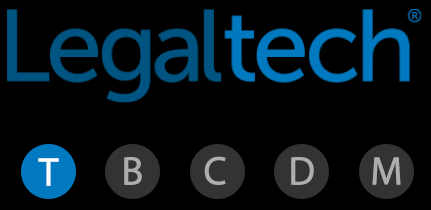eDiscovery Daily Blog
Thoughts About Legaltech New York 2018: eDiscovery Trends
We’ve completed another LegalTech New York (LTNY) (a subset of “Legalweek”). What did attendees at the conference think about this year’s show? Let’s take a look.
As I’ve done the past couple of years, I reached out to several attendees (some of whom I met with during the show) to get their thoughts and impressions of this year’s show. As always, these should be taken as their personal opinions and observations regarding the show, not those of their employer or clients. With that in mind, here is what they had to say:
Shawn Gaines, Director of Product and Community Marketing at Relativity: “Although every conversation I had at the show seemed to hit on the fact that the show itself seemed much cozier than in the past—exemplified by the consolidated expo hall—there was still plenty of energy in the places the show really happens: conference rooms and meeting suites, restaurants and happy hours, and even some local venues. Beyond that, conversations tended to turn away from typical e-discovery topics to the innovations coming out on top of it—the folks doing more with their existing platforms, developing new applications and integrations to make the best use of what they have.”
Tom O’Connor, Director at Gulf Coast Legal Technology Center: “Attendance was clearly down and the number of exhibitors was spread out over half a dozen local hotels. Educational content continues to be predominantly infomercials for major sponsors. Main benefit to me was as a B2B forum and that aspect was very good.”
Ralph Losey, E-Discovery Lawyer at Jackson Lewis, P.C. and Author of E-Discovery Team: “LegalTech seems to have outgrown its old home at the Hilton. They should find a bigger space elsewhere.”
Rob Robinson, Data and Legal Discovery Technologist, ComplexDiscovery Blog and CloudNine: “On the eDiscovery front, Legaltech continues to be a galvanizing and polarizing conference at the same time. Galvanizing in the fact of the idealistic yet tangible excitement generated during the event by the sharing and championing of new technologies and approaches to solving eDiscovery challenges. Polarizing in the fact that when viewed through the lens of event participation, the gap between the well-funded and well-connected companies and commentators and those not as well financed or connected appears to be increasing. This increasing gap prevents many great products and points of view from breaking through the noise of paid advertising, sponsorships, and relationships and may be one of the contributing factors to the perceived decrease in status and the actual decrease in provider participation in one of the most successful event franchises in the history of eDiscovery. The benefits of galvanization may continue to outweigh the detriments of polarization, but not by as much as in past years.”
Michele C.S. Lange, Freelance writer and attorney: “If you left Legalweek and learned nothing about machine learning, deep learning or supervised learning, you attended some other random conference. This was the year to dig deep on AI.”
Jason R. Baron, Of Counsel at Drinker Biddle & Reath LLP: “I was heartened to see “AI” being discussed everywhere one travelled at Legaltech this year. The movement toward embracing smarter analytics in e-discovery (predictive coding, TAR, etc.) now looks to be a “feature” of a more comprehensive discussion we are engaged in as to how the law should embrace all manner of artificial intelligence in connection with the Internet of Things and beyond. I also appreciated more sophisticated attention being paid to ethical aspects of the coming AI revolution, in sessions such as the one moderated by Martin Tully and including Ralph Losey and Shannon Kirk discussing E-Discovery in the Year 2048: What the Future Holds. In my mind, however, we need not wait until 2048 to discuss whether public and private sector institutions should be creating algorithmic review boards (similar to existing IRBs for human subjects) to review potential bias and discrimination in the use of algorithmic inputs, or other novel issues involving big data aggregation and surveillance. The future is coming faster than anyone in the “ESI” universe of ediscovery ever imagined, as this year at Legaltech made abundantly clear.
David Horrigan, Discovery Counsel & Legal Education Director at Relativity: “Not surprisingly, just about every poll will put “artificial intelligence” at the top of the Legalweek 18 takeaway list, but it was a different conversation this time. The educational sessions did a good job of taking the discussions beyond the HAL 9000 nightmare of the robots taking all jobs, bitcoins, and lives as we know them. There were efforts made to define artificial intelligence—not unlike those erstwhile attempts to define “information governance”—but there were also practical privacy analyses, such as the HIPAA considerations of robots dispensing medications. Overall, the conversation went beyond fear and loathing to embracing and regulating.”
Craig Ball, eDiscovery Thought Leader and Author of Ball in Your Court blog: “LegalTech is like a party that keeps going long after the host has gone to bed. Its deep value lies in the conversations in the halls, balls and barroom stalls of Midtown West. “What are you working on?” “Have you heard about…?” “We bought their product and it was a disaster/delight.” The Hilton’s still the hub, but the action’s in its orbit. New York supplies the juice.”
– – – – – – – – – – – – – – – – – – – – – – –
As for my own thoughts, the conference seemed smaller yet again this year, especially in the exhibit hall. One colleague pointed out to me that the number of exhibitors (not companies that were listed as “LegalCIO” or “Business of Law” participants) was down again this year. Industry consolidation or lack of willingness of providers to participate or both? You decide. As for the sessions, I attended a handful in between meetings and they were high quality once again. I heard some raise concerns that the sessions were mere vendor infomercials, but I didn’t see that in the ones I attended – they were good quality with knowledgeable panelists. AI and GDPR were the topics of the year, and rightly so.
I think ALM needs to (finally) consider moving Legaltech to a new venue as much of the activity is conducted in suites in hotels like the London and Warwick. Rob used the terms “galvanizing” and “polarizing” above and I think those terms wonderfully describe the state of the conference today. A lot of people rarely or never make it over to the exhibit hall or the sessions. A venue that includes plenty of breakout rooms onsite would – if the breakout rooms were priced reasonably – keep all attendees plugged into the heart of the conference instead of disbursed. And, it could keep those vendors who currently don’t participate engaged at some level so that a $2,500 attendance fee for non-participating vendors wouldn’t be necessary. Creative thinking is needed for Legaltech to remain among the most important conferences each year.
So, what do you think? Did you attend this year’s Legaltech? If so, what did you think of the conference? Please share any comments you might have or if you’d like to know more about a particular topic.

Sponsor: This blog is sponsored by CloudNine, which is a data and legal discovery technology company with proven expertise in simplifying and automating the discovery of data for audits, investigations, and litigation. Used by legal and business customers worldwide including more than 50 of the top 250 Am Law firms and many of the world’s leading corporations, CloudNine’s eDiscovery automation software and services help customers gain insight and intelligence on electronic data.
Disclaimer: The views represented herein are exclusively the views of the author, and do not necessarily represent the views held by CloudNine. eDiscovery Daily is made available by CloudNine solely for educational purposes to provide general information about general eDiscovery principles and not to provide specific legal advice applicable to any particular circumstance. eDiscovery Daily should not be used as a substitute for competent legal advice from a lawyer you have retained and who has agreed to represent you.

